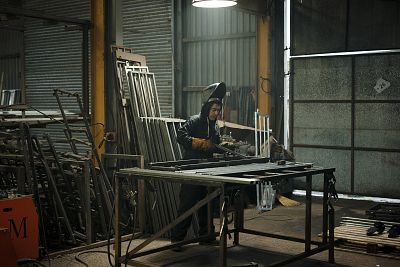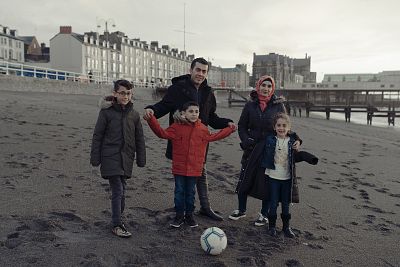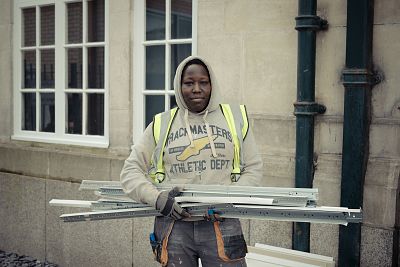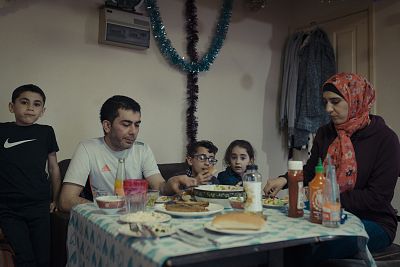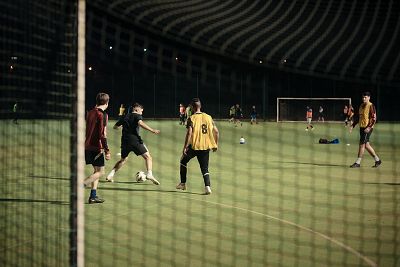"There is a phrase, 'Welcome to the valleys and the hillsides of Wales,' because that is how we've always been — a nation that welcomes people."
ABERYSTWYTH, Wales — The blacksmith had never heard of Wales before he was told he was about to move there.
 ADVERTISEMENT
ADVERTISEMENT
 ADVERTISEMENT
ADVERTISEMENT
Mohammad Karkoubi had agreed to be part of a British government program to resettle Syrian refugees across the United Kingdom.
Accompanied by his wife and three children, Karkoubi was handed a welcome guide in Arabic on the flight over that explained that Wales was a small country with its own language, green mountains and lots of sheep.
Some three years later, Karkoubi works as a welder in a small workshop in Tregaron, a farming community in central Wales. As well as learning English, the native Arabic speaker is also attempting to master Welsh.
A 35-year-old Aleppo native, Karkoubi may be a way off from fluency, but his integration into the local community is what the Welsh government hopes all refugees will have the opportunity to achieveunder a new plan.
News
While countries throughout Europe have closed their borders to asylum-seekersand looked to discourage those who arrive from settling permanently, Wales says it is intent on becoming a "nation of sanctuary" for those fleeing war and persecution.
"There is a phrase, 'Welcome to the valleys and the hillsides of Wales,' because that is how we've always been — a nation that welcomes people," said Jane Hutt, a veteran Welsh lawmaker who is responsible for implementing the program.
The Welsh government says it will continue to comply with U.K. immigration law stipulating who can come to Britain and what rights they have — in that sense differing from sanctuary cities in the U.S. that limit cooperation with federal authorities.
Instead, the government's 35-page plan focuses on how to deal with refugees and asylum-seekers already living in Wales. It has been endorsed by the United Nations and includes funding projects to find homes for newly recognized refugees, introducing mentoring programs to combat loneliness and mental health issues among asylum-seekers, and increasing access to language tuition to boost their chances of employment.
"Refugees and asylum-seekers are and will become doctors, carpenters, farmers, radiographers making a contribution to the community," added Hutt, outlining her vision for the plan.
An understanding of Welsh culture, language and heritage is also encouraged in a country where people are greatly attached to their national identity after centuries warding off the dominance of neighboring England.
'We understand how it feels to be disregarded as nobodies'
In Ceredigion County, where Karkoubi lives and works, the notion of a Welsh welcome is taken seriously.
"We understand how it is to be disregarded as nobodies," John Jones, a retired teacher who was meeting a friend at the pub in Tregaron, said, referring to an understanding among the Welsh of what it feels like to be a minority next to the English.
In the coastal university town of Aberystwyth, where the Karkoubis live, many residents said they were pleased to have Syrians in their town.
Lucy Berridge, a construction worker, said anyone fleeing war or poverty should be welcome. "They're only trying to make their lives better," she said.
Rhydian Evans, who works in retail, said Aberystwyth was a safe place for those fleeing war. "Everyone knows everyone here so there's a chance to be part of something, to feel part of the community," he said.
It was the coverage of children drowning in the Mediterranean Seain the summer of 2015 that appears to have turned common feeling into action.
That September, then-Prime Minister David Cameron said "the whole country had been deeply moved by the heart-breaking images" as he announced that the U.K. would accept up to 20,000 more Syrian refugees over five years. (So far, Britain has resettled some 14,600.)
World news
The next day, Ceredigion became one of the first places to agree to help. In the last quarter of 2015, the county of 73,000 people took in 10 Syrian refugees. London with its population of 8.7 million took in 24. Since then Ceredigion has taken in 47 more Syrian refugees either through the government program or community sponsorship programs.
Grassroots organizations also sprung up. That summer volunteers formed Aberaid to raise awareness of the refugee crisis and money for those in need. Now a registered charity, it has sponsored two Syrian families to settle in Aberystwyth and helped dozens more integrate into the community — including the Karkoubis.
Three years after arriving on a chilly December night, the family from Aleppo say they are happy. "The time is flying," said Karkoubi's wife, Eshraq, 29. "It's a lovely town, very safe, very friendly people."
She is not working because she is recovering from surgery, but hopes one day to become a chef at Aberystwyth University. The children are also settling in well and now speak English fluently.
In many ways, it is Mohammad who is struggling the most. "I really like this great country. It's very beautiful, very kind and it's helped my wife and children," he said.
But learning both English and Welsh while working a four-day week is proving an uphill battle. At a recent Welsh class, Karkoubi struggled to follow the telephone role-play exercise and looked tired after a day on the job.
In the workshop, his colleagues tease him that his Welsh vocabulary doesn't extend much beyond "amers te," or "tea time," but they say he's a keen learner and is slowly showing improvement. "I speak Welsh to him everyday," Steve Tandy, a co-worker, said. "If he had no interest I wouldn't bother."
Finding a job, playing soccer
While the Karkoubis have their difficulties, they are hiccups compared to the problems faced by many asylum-seekers living in Wales. Under British law, most are banned from working until they obtain a different immigration status.
Salah Rasool, who runs the Welsh Refugee Council's government-funded Move-On project, said finding a job is the key to feeling included and avoiding falling into poverty.
World news
He said the British system focused on allowing refugees to start claiming benefits as soon as possible, making them dependent on the state when they should be — and want to be — contributing to society.
"You wake up in the morning, you go to work, these are the struggles of normal people. It's important, it's life," Rasool said, adding that often without work it can be a challenge for refugees to feel "100 percent" part of society.
"I'm losing my hair because all I think about is when I'm going to get a visa, when I'm going to have a nice life," said Rebwir Kadir, 28, an Iraqi asylum-seeker who was at the refugee council for an appointment with a caseworker.
Kadir cannot work and says he has been appealing the government's decision to reject his asylum claim for more than 10 years. He says he sleeps on friends' couches.
Hazar Almahmoud, 49, a Syrian refugee who paid smugglers and used fake passports to reach the U.K. in 2016, said she has struggled to secure a permanent job.
"I had many interviews, I am confident with my qualifications and skills, but when I get to the interview I get stressed and panic," said Almahmoud, who used to work as an administrator in her hometown, Latakia.
World news
She said she feels it's unfair that refugees aren't given more of a chance to prove themselves.
Karkoubi's employer, David Rees, has clearly been patient.
"We do our best to help him. It can be hard work," Rees said when NBC News visited his workshop last month. "But he's a good worker, and he 100 percent wants to please."
And everywhere there seem to be stories of people trying to help newcomers feel at home.
Dave Price, 59, now has four asylum-seekers playing for the soccer team he manages in his spare time.
Khaled Ahmed Mousa, 30,suits up for Tongwynlais each Saturday.
The Sudanese national says it gives him something to look forward to in what is otherwise an uneventful week.
Before soccer, he said he did not mix a lot with locals.
"It was a good opportunity to meet Welsh people," he said.
Having asylum-seekers on the team has also opened the eyes of its Welsh-born players, according to Price.
"We can be a conduit to them integrating into society," he said, "and that's how it should be."











